
17 government inspectors, 170 companies and more than 9,000 potential infractions: inside B.C.’s oversight of the oil and gas sector
Notes made by regulator officers during thousands of inspections that were marked in compliance with...
The timeline of the Doug Ford government’s decision to remove parcels of land from Ontario’s Greenbelt has always been murky. The November 2022 decision to open up parcels to development landed like a bombshell, in part because both Ford and Housing Minister Steve Clark had repeatedly promised to keep the long-protected wetlands and farmland surrounding the Greater Toronto and Hamilton Area intact.
The back-and-forth over who knew what about the decision to open the Greenbelt — and when — intensified as Ontarians realized most of the land where environmental protections were dropped belonged to prominent developers. Then, an investigation by The Narwhal and the Toronto Star showed six of those developers bought some of their Greenbelt property after Ford came to power. Many were connected to the government through donations or lobbyists.
Ford and Clark repeatedly maintained that non-political public servants chose the locations to be removed, and that neither they nor their offices knew those locations until days before the public announcement. Still, skepticism ran high and calls from the public and opposition parties kicked off multiple investigations into the Greenbelt land decision, including one by auditor general Bonnie Lysyk.
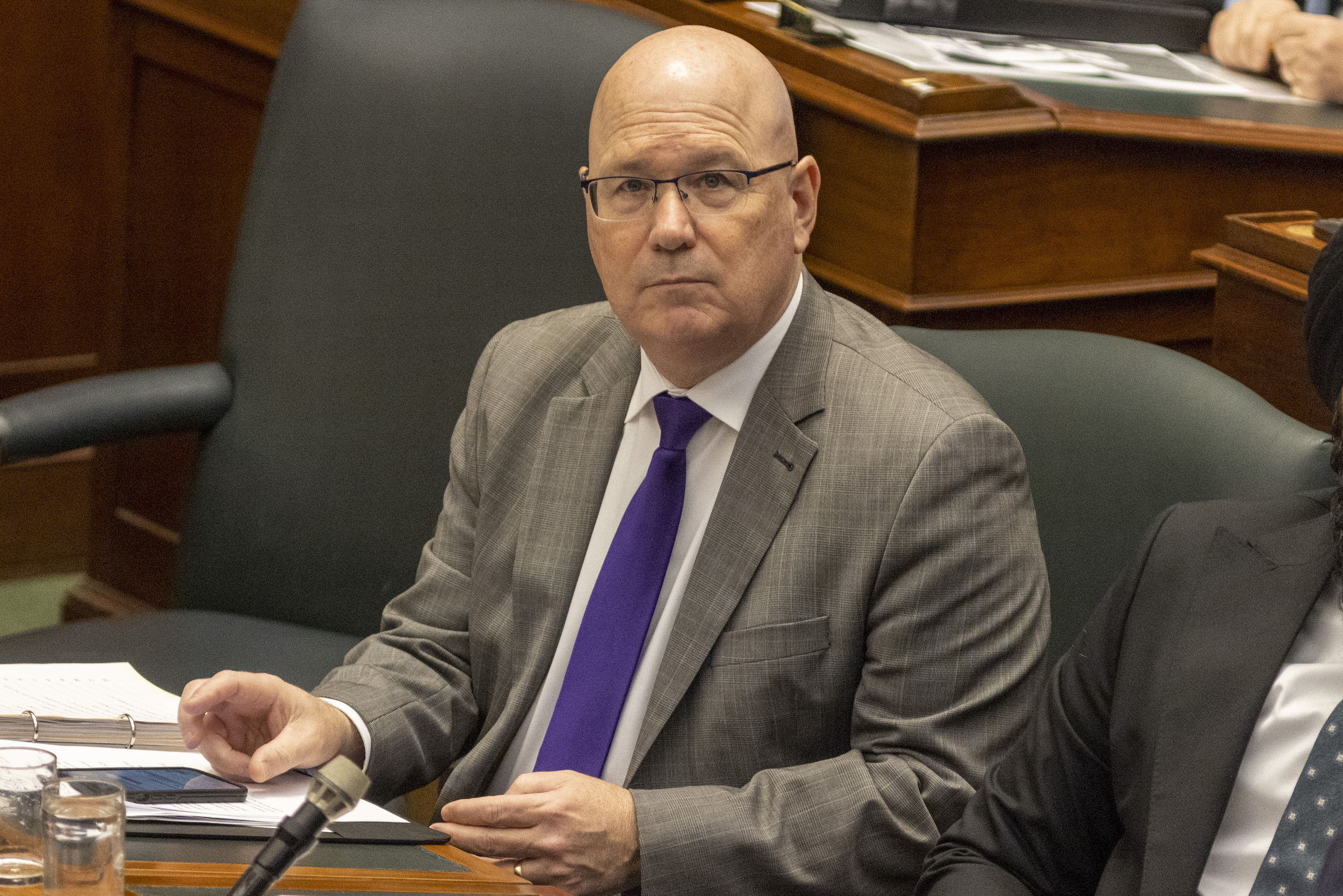
On Aug. 9, Lysyk released her report — and it further complicates the timeline. It found that Clark’s chief of staff “substantially controlled and directed” the process of removing protected areas from Ontario’s Greenbelt, giving “preferential treatment” to a group of developers. Lysyk added some specific dates, like one in September 2022, when Clark’s chief of staff received a “package” of requests to remove land from the Greenbelt at a dinner hosted by a building industry association.
Overall, Lysyk concludes the Ford government should “re-evaluate” its decision about Greenbelt, since the choice of land to remove was “biased, controlled and directed” by Clark’s chief of staff, rather than “informed by environmental, agricultural and infrastructure considerations.” She also notes the government received 35,000 public comments on the proposal — the vast majority negative — yet passed the legislation cementing the land openings without any changes.
These are the dates on the timeline so far, starting with the most recent and looking back all the way to 2018 when Ford, still a candidate, promised to open a “big chunk” of the Greenbelt — saying he’d gotten the idea from “some of the country’s biggest developers.”
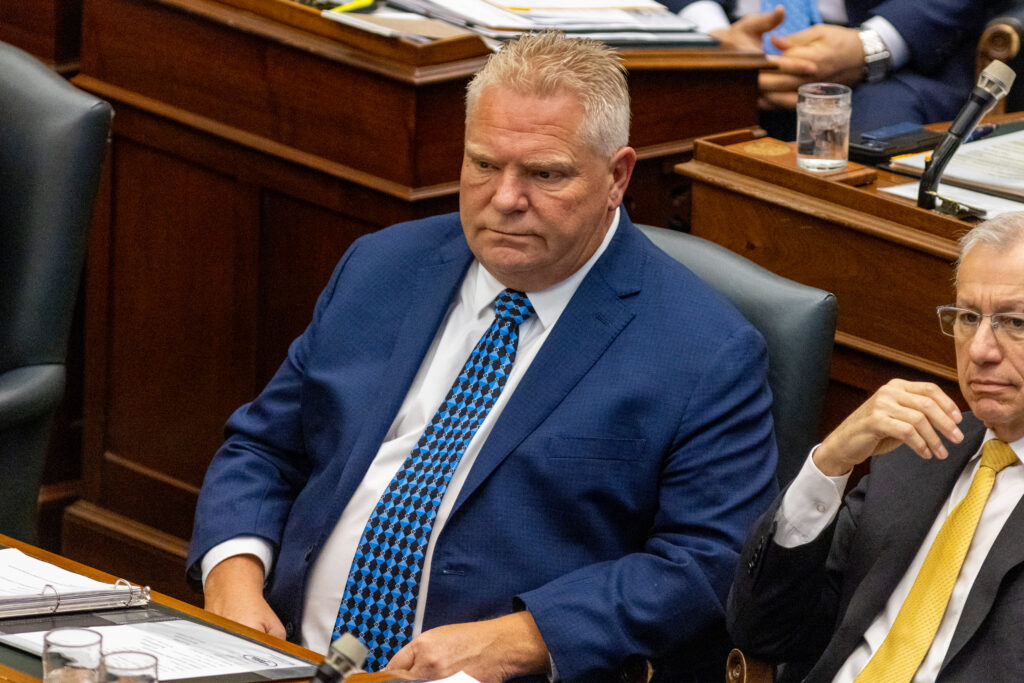
In an explosive 95-page report, Lysyk pointed to Housing Minister Steve Clark’s chief of staff as the link between the Ford government and developers. While Clark maintains he didn’t know his staffer had received requests for specific parcels to be opened, Lysyk wrote that he probably should have: “Given the high level of public interest that any change to the Greenbelt’s boundary was expected to carry, the housing minister ought to have known the process used that would lead to the removal of land from the Greenbelt, and ensure that cabinet and the premier were also made aware of these details.”
The report did not name specific developers that passed requests on to Clark’s chief of staff, but did mention one of the requested sites is now the location of Cherrywood, a proposed development in the formerly protected Duffins Rouge Agricultural Area on land owned by developer Silvio De Gasperis. As CBC reported in July, De Gasperis and another developer, Michael Rice, each asked a court to block or delay Lysyk from interviewing them as part of her audit.
At a press conference after the report was released, Lysyk confirmed that it was Rice and De Gasperis that gave requests to Clark’s chief of staff.
From January 2021 to April 2022, Luca Bucci served as a senior staffer to Municipal Affairs and Housing Minister Steve Clark. A month after he left Clark’s office, Bucci registered to lobby the same ministry he used to work at on behalf of the Ontario Home Builders’ Association, an industry group representing builders and developers across the province.
According to his lobbyist registration, the long-time Conservative aimed to communicate with government officials about “land use and planning matters,” including “proposed or pending amendments” to at least three pieces of legislation that impact development on environmentally sensitive lands. In June 2022, Bucci became the association’s CEO.
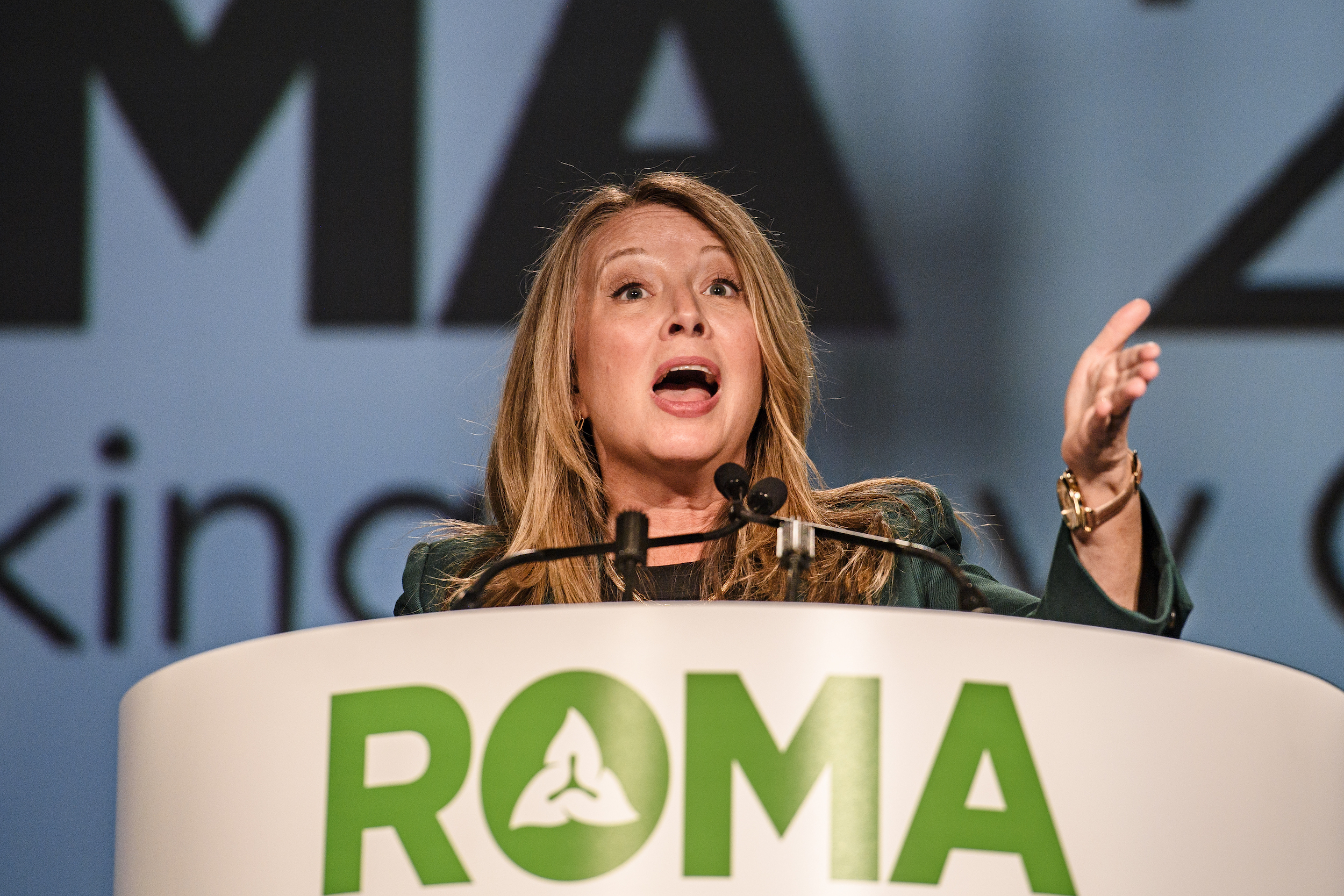
Bucci’s move raised eyebrows when, mere months later, the government dropped protections on Ontario’s Greenbelt. Legislative guidelines prevent former public servants from lobbying past employers for a year to prevent real or perceived conflicts of interest and Ford’s Greenbelt move seemed set to benefit the members of the organization Bucci was now heading.
In December 2022, Ontario NDP leader Marit Stiles filed a complaint with the province’s integrity commissioner alleging Bucci had engaged in illegal lobbying. The complaint alleges Bucci was connected to a parcel of land in King Township sold just two months before the government opened the Greenbelt. Stiles alleged the land was sold by a company whose head was president of the builders’ association at the same time that Bucci was CEO.
The province’s integrity commissioner launched an investigation based on this complaint and is expected to release a full report.
Earlier this month, according to reporting by The Trillium, Bucci abruptly resigned as CEO of the association without any explanation.
In late June, auditor general Bonnie Lysyk issued a summons to two Toronto-area developers, Silvio De Gasperis and Michael Rice. Both developers own formerly protected Greenbelt land and, as a Narwhal/Toronto Star investigation revealed, both bought some of it in the months between Doug Ford becoming premier and his government dropping environmental protections.
Both also seem to be major donors to the Progressive Conservative party: as the Narwhal/Star investigation reported, Rice’s companies, someone with his name and people whose names match those of his senior staff have donated $47,000 to the Progressive Conservatives since 2014. Names that match those of De Gasperis family members, their companies and senior staff donated $294,000 to the Tories.
Lysyk’s summons asked De Gasperis and Rice to submit to an “examination under oath” and bring any relevant “records, correspondence, notes and documents,” according to the court filing reported on by CBC. In July, each asked a court to block or delay the auditor general of Ontario from interviewing them as part of her audit into the government’s opening of the Greenbelt.
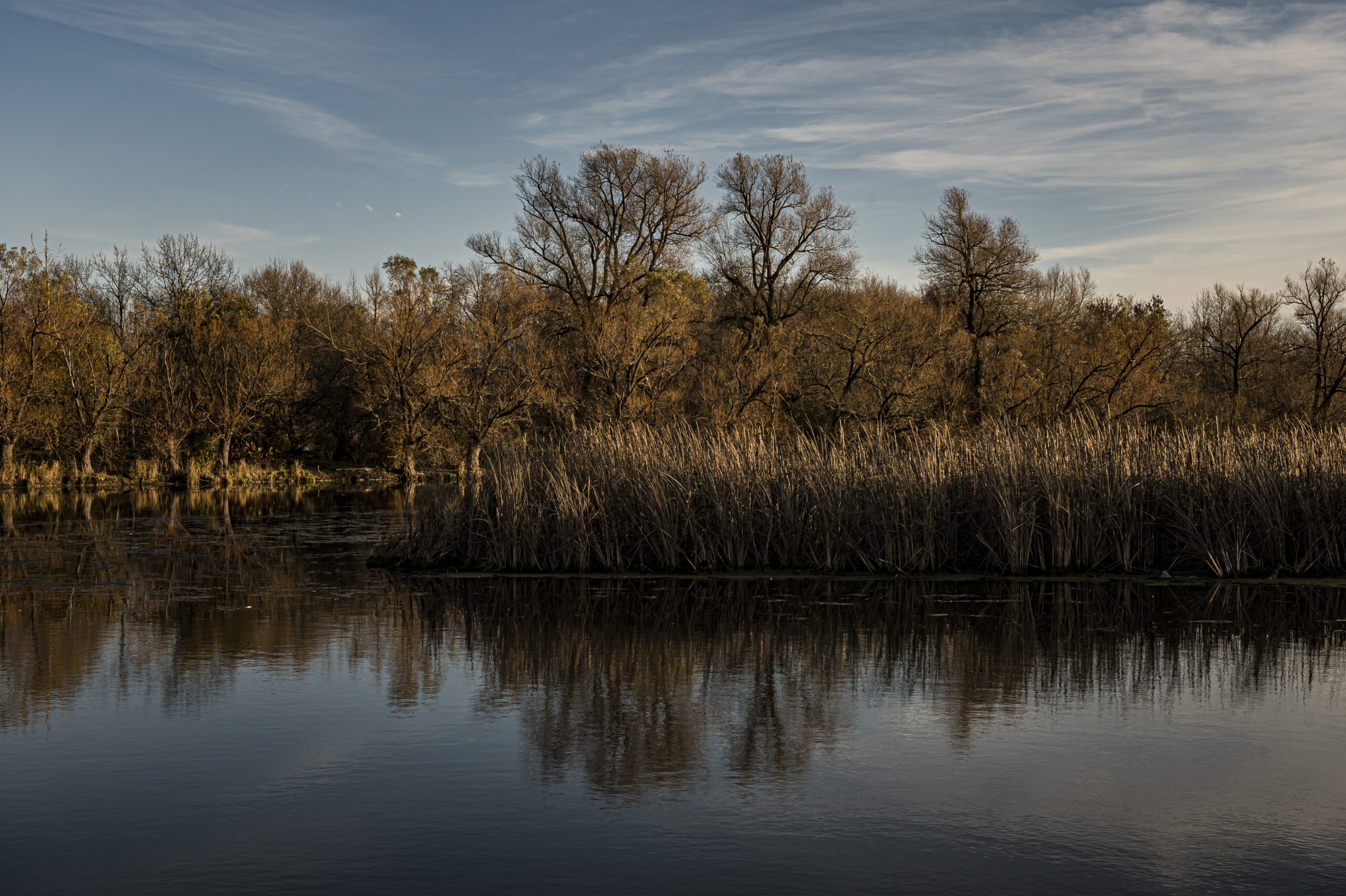
De Gasperis told the court he doesn’t have the information the auditor general is seeking — which include details about his company TACC Group’s dealings with the Ford government about the Greenbelt lands it owns — and argued she did not have the jurisdiction to conduct the audit.
“If it is a value-for-money audit, we cannot understand how it could be achieved at this stage, primarily, because the costs of development to the developers are unknown,” Neil Wilson, a lawyer representing TACC Group, told CBC in a statement in July.
Rice told the court the auditor general’s summons oversteps her authority, arguing her role “is not to investigate, audit and/or examine private citizens under oath, or go on fishing expeditions with respect to their private corporate affairs.”
The elected council of Six Nations of the Grand River voted to formally object to the Ford government’s plan to open parts of the Greenbelt to development. The council said that because the province did not meet its constitutional duty to consult First Nations, the plan “breaks the law.”
As reported by The Narwhal and the Toronto Star, Ontario developers, including De Gasperis of TACC group, spent nearly $173 million to buy 524 acres of land in the former protected Greenbelt region over five days in early June. This includes lands in the ecologically important Duffins Rouge Agricultural Preserve, known as the “crown jewel” of the Greenbelt.
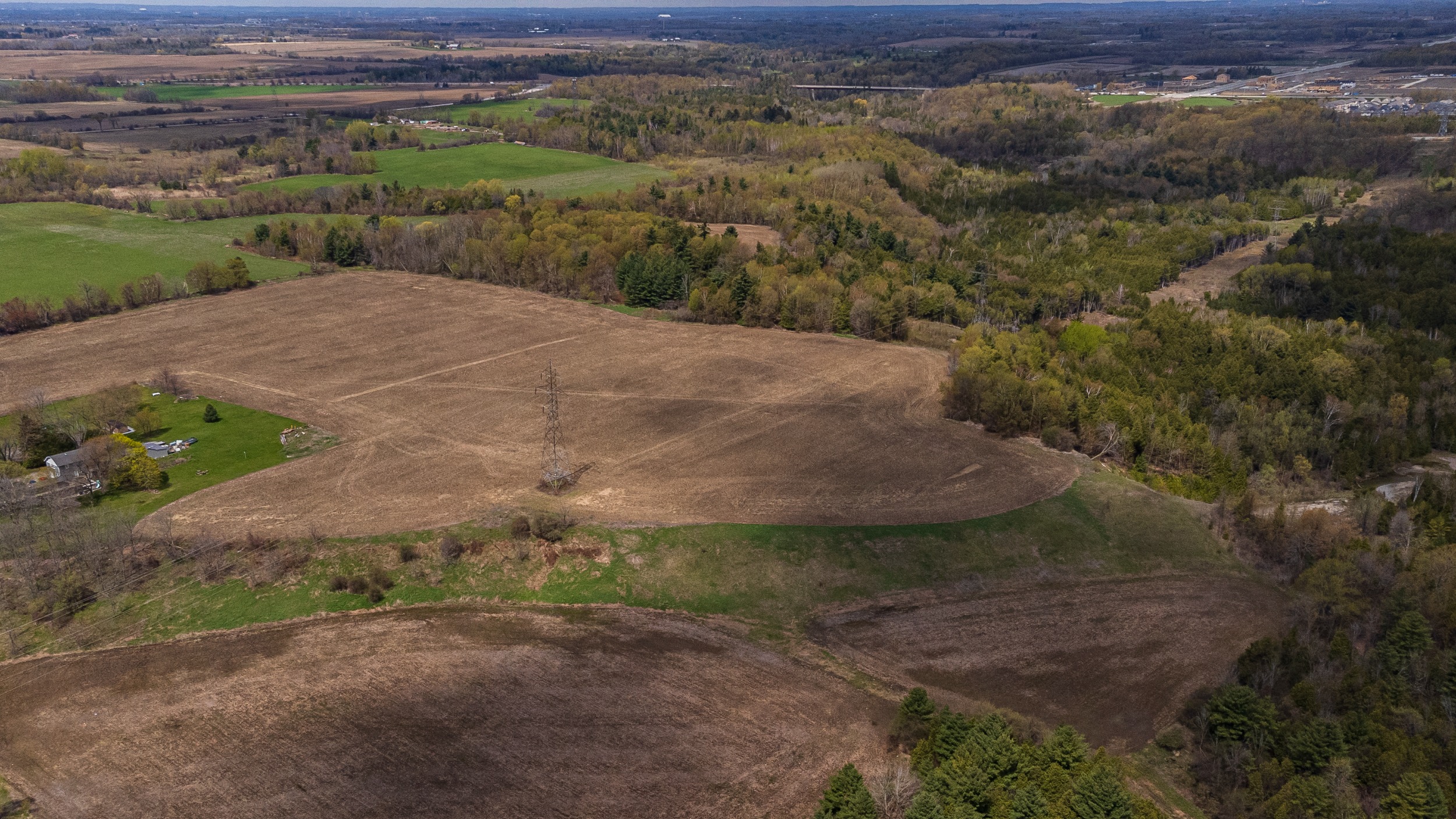
The Ford government has announced plans to allow construction of up to 30,000 homes by De Gasperis in the Cherrywood development proposed for the preserve, where most of the Greenbelt lands that have been opened for development are located. Durham Region opposes the plan, but the province could overrule the municipality by issuing a controversial minister’s zoning order, or MZO. Last year, auditor general Lysyk concluded many of the same developers implicated in the Greenbelt narrative have benefitted from MZOs in the past.
In response to pushback and questions about the government’s Greenbelt plans, the premier called the protected area a “scam” created haphazardly by the previous Liberal government.
“We have a Liberal government that [got] a bunch of staffers, randomly got a highlighter and went up and down roads. They were going through golf courses, through buildings. It was just a big scam as far as I’m concerned,” the premier said of the 2005 government that established the protected area.
“I think we’re doing pretty good on the so-called Greenbelt … as the Liberals made up that name,” Ford said. “Let’s just be honest, the Greenbelt was a failed policy, a flawed policy from the Liberal government.”
Guilbeault clapped back soon after. “I profoundly disagree with the characterization of Premier Ford when it comes to the Greenbelt,” he told CP24. “We need those green spaces to have clean air, clean water.”
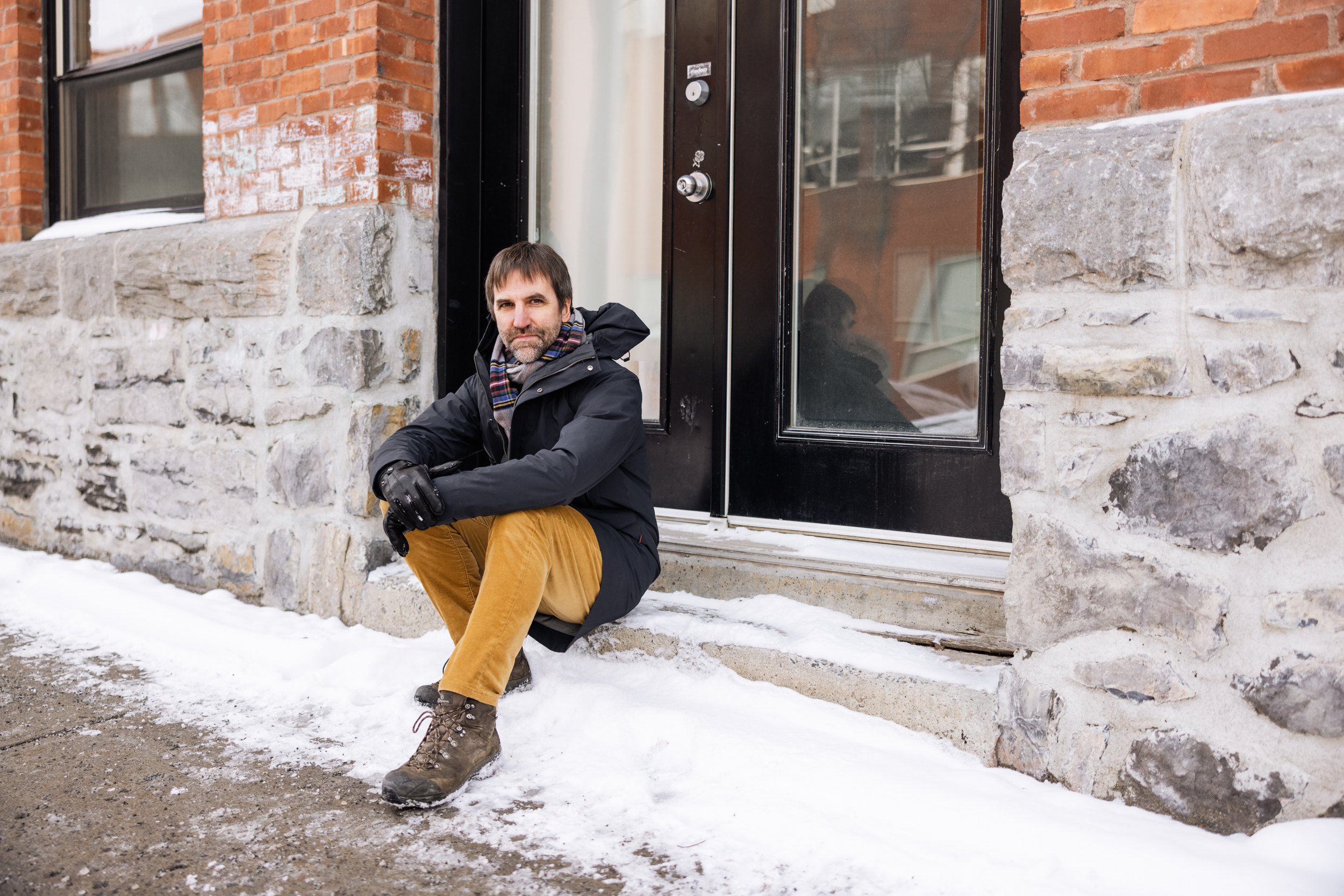
Guilbeault asked the Impact Assessment Agency — a federal body that studies the environmental, economic, social and health impacts of potential projects — to examine the cumulative effects of past, present and future construction projects “on the integrity” of Rouge Urban National Park. The park is next to the ecologically significant Duffins Rouge Agricultural Preserve.
The request fell short of the environment minister’s full powers: Guilbeault could have asked the agency to conduct a regional assessment, which requires collaboration between levels of government.
Guilbeault said Ontario is “simply refusing to look at the environmental impacts of the proposed development” and ignoring the duty to consult Indigenous communities. “There is zero desire for public consultation, no desire for transparency and no desire to understand the environmental impacts and health impacts to Ontarians of going ahead with these developments,” he said.
“I say this to all parties involved in Greenbelt development: the federal government is paying very close attention,” Guilbeault told Toronto Life a few weeks later. “If you’re a developer thinking you’ve just struck gold and can start building tomorrow, know that the government could intervene.”
A briefing note obtained by Global News via access to information laws catalogued all endangered or threatened species across the parcels of land opened by the Ford government. It found 29 at-risk species protected under federal legislation live on the lands, which means Ottawa could use a whole host of tools to intervene, as it has done on Highway 413.
A topless woman interrupted singer Avril Lavigne on the Junos stage in Edmonton with the words “Save the Greenbelt” and other environmental messages written on her body. The eye-catching protest was the latest in an avalanche of outrage coming from city councils, environmental organizations and the public and showed the conversation over Ford’s Greenbelt decisions had reached beyond Ontario.
In response to questions from The Narwhal, the federal environment minister criticized the Ford government’s move. Guilbeault said it “flies in the face of everything we’re trying to do in terms of being better prepared for the impacts of climate change.” He warned his office could employ several tools to halt Greenbelt development, including species-at-risk legislation and the Impact Assessment Act, which has been used to launch a federal review of Highway 413, delaying construction.
“I think we’re being told that in order to provide housing to Canadians, we need to destroy nature,” Guilbeault said. “I profoundly reject that premise.”
The next day, Ford said he was “disappointed” by Guilbeault’s comments. “This is our jurisdiction,” he said. “You can’t complain about not having enough housing for years and then complain when we come up with a solution to do it.”
The Greenbelt Council is an independent government-appointed expert panel that advises the province. For years, it has opposed any development in the protected area. But after the resignation of multiple members, former Mississauga mayor Hazel McCallion was appointed chair in October 2022. In early 2023, McCallion wrote an open letter calling the Ford government’s move “brave, important, responsible and necessary” — a dramatic departure from the council’s long-time advocacy, but unsurprising coming from McCallion, long known as the “queen of sprawl.”
“The most recent changes to the Greenbelt, actually do make sense,” the 101-year-old McCallion wrote. “If we are to meet the challenges of the epically growing human population of the [Greater Toronto Area] and provide truly livable and affordable communities, then we must allow for housing and new communities to be created where it makes sense to do so.”
McCallion died 11 days after the letter was released, leaving the Greenbelt Council with just three active members and six vacant seats.
The Ontario Provincial Police received more than a dozen complaints over Greenbelt land sales: one came from the charity Environmental Defence, which wanted to know if any developers were tipped off to the government’s plans. The police service’s anti-rackets branch started conducting interviews to determine whether to launch a full-scale investigation.
Ontario’s integrity commissioner David Wake initially declined to investigate. After multiple requests from opposition politicians, Wake released a preliminary report, saying the requests relied on media articles that “may raise a reasonable suspicion of … owners being ‘tipped off’ to the changes to the Greenbelt plan but that does not amount to reasonable and probable grounds to enable me to conduct an inquiry.”
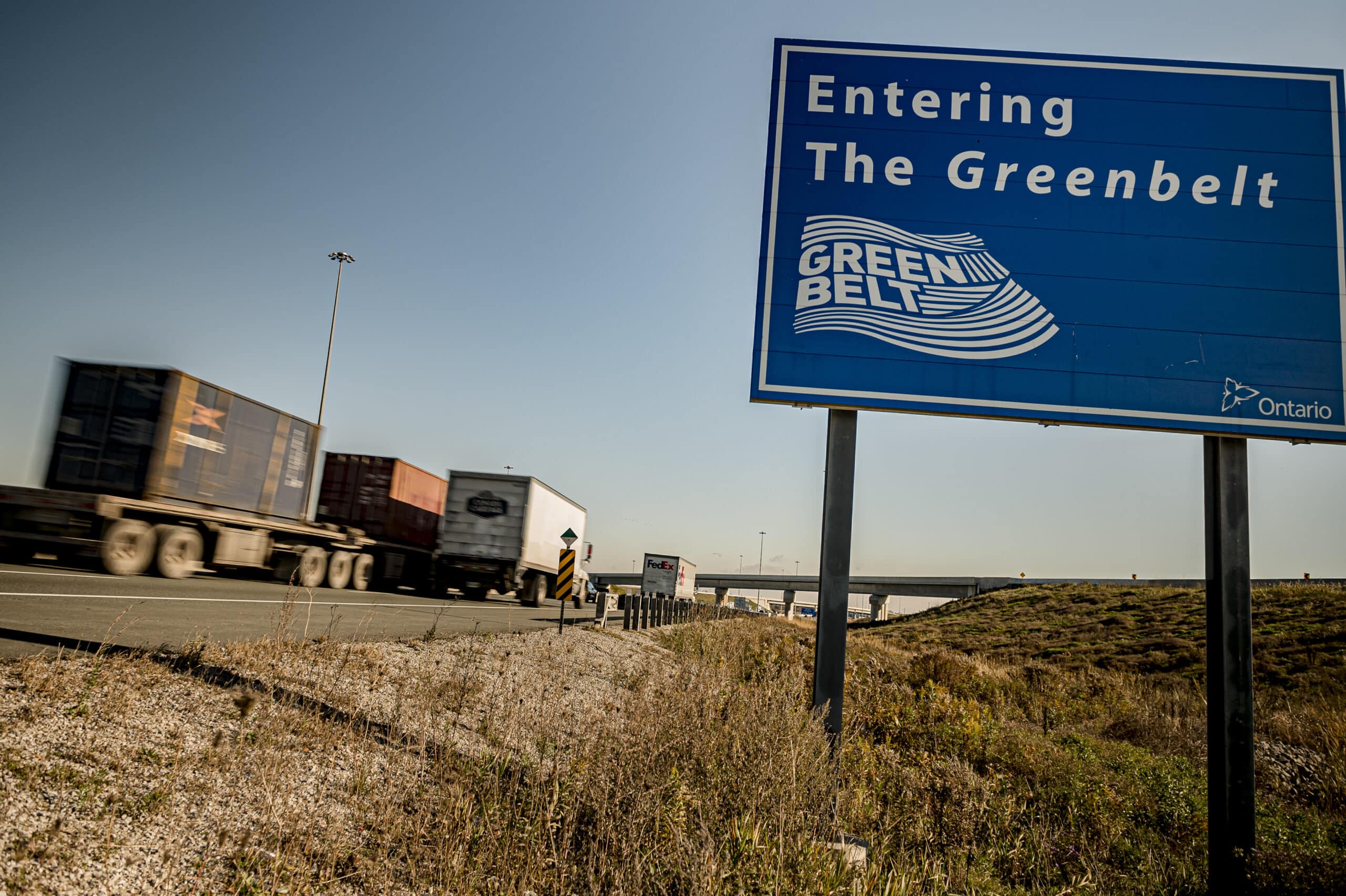
But after Ontario NDP leader Marit Stiles sent Wake’s office new information alleging at least one developer had prior knowledge of protections being dropped, Wake launched an investigation. He is working on a final report about all the Greenbelt-related complaints received by his office.
Opposition leaders and members of the public also asked Ontario auditor general Bonnie Lysyk to conduct an audit of the financial and environmental implications of the Greenbelt opening. She confirmed that after receiving “considerable correspondence” on this issue, her office would audit the government’s decision with “full cooperation” from the relevant ministries.
Mississaugas of the Credit First Nation Chief Stacey Laforme told CityNews his Nation was also considering legal action. He said he had been left with little recourse, as much of the 3,000 hectares of Greenbelt land opened up is in its territory.
Less than a year after he was appointed, Doug Varty, chair of Ontario’s Species Conservation Action Agency, stepped down in protest of the Progressive Conservatives’ dismantling of environmental protections over land use.
The Ontario government created the agency in 2021 to administer a new provincial fund for species at risk. That fund allows industry to do work even if it harms the habitats of six species at risk — the butternut tree, Blanding’s turtle populations in the Ontario shield region and four birds — on the condition they pay into the fund. Critics have called it a “pay to slay” fund.
In a LinkedIn post, Varty said he was resigning because of the Progressive Conservatives’ changes to land use policy, and because the government “is not listening to or acting in the best long-term interests of the people of this province.”

In a letter to the Ontario government, the federal agency said the government’s move violated a long-standing agreement that mandates the province to consult the agency before changing the boundaries of the Greenbelt. The agreement was made to protect Rouge National Urban Park, on the eastern edge of Toronto, which borders the Duffins Rouge Agricultural Preserve in Pickering, among the Greenbelt parcels opened to development.
Any changes made to these lands would create “probable risk of irreversible harm to wildlife, natural ecosystems and agricultural landscapes within Rouge National Urban Park,” the letter said.
The joint investigation revealed that six developers bought Greenbelt land after Ford’s first win in 2018 — the same year Ford was recorded telling a private audience he would “open a big chunk” of the protected area if he became premier. They, along with other developers who own portions of long-protected land have held it for many years, now stand to make immense profits, raising questions about whether these landowners had prior knowledge of this plan.
For example, Rice Group paid $80 million for almost 300 hectares of protected land in King Township, just north of Toronto, just six weeks before they were opened to development. TACC Developments, headed by prominent developer Silvio De Gasperis (brother of Michael De Gasperis) paid $50 million in May 2021 for 40 hectares of farmland in Vaughan, which also lost protections when the Ford government made this move.
The bombshell announcement made late last year broke promises made by Ford and other government officials to keep the protected area intact. But Municipal Affairs Minister Steve Clark told the Toronto Star the situation had changed and a province-wide housing supply crisis demanded “bold, transformative change.”
The proposal is essentially a land swap: the government planned to open 15 parcels of protected Greenbelt land, totalling 3,000 hectares, across the Greater Toronto and Hamilton Area, as well as in the communities of King, Vaughan, Richmond Hill, Whitchurch-Stouffville, Markham, Pickering, Ajax, Clarington, Hamilton and Grimsby. In exchange, the government added another 3,800 hectares from elsewhere to the Greenbelt, though much of it was already protected through other mechanisms.
There was one caveat: developers must show proof of “significant progress” by 2023 and start construction by 2025, or the land will be returned to the Greenbelt.
This is one of the most explosive pieces of information in the auditor general’s report: that 92 per cent of the land where Greenbelt protections were dropped were pointed out to Clark’s chief of staff by “prominent developers.”
The first two sites were highlighted in a “package” provided to the chief of staff on Sept. 14, 2022, while three others requested “shortly after.” The chief of staff told Lysyk that they didn’t tell the developers at the time that the government was considering altering the boundaries of the Greenbelt.
The day after the dinner, on Sept. 15, 2022, a company run by developer Michael Rice spent $80 million on 283 hectares of protected land in King Township, one of the parcels Lysyk identified from the Sept. 14 package. Just six weeks later, Greenbelt protections were dropped.
In her report, Lysyk estimated that the owners of the opened lands are set to collectively see a property value increase of nearly $8.3 billion. This comes at great environmental cost, the report says: the Greenbelt changes will result in the loss of 1,000 acres of wetlands and woodlands and threaten at least 29 species at risk.
Global News and the Toronto Star reported that prominent developers who have benefitted from government decisions were present at a pre-wedding stag-and-doe party for Ford’s daughter, which had an entry fee of $150. One developer highlighted in the Narwhal/Toronto Star investigation into Greenbelt land sales also attended the wedding.
Months later, as reporters began investigating the parties, the premier’s office asked Ontario’s integrity commissioner to weigh in. The commissioner said no wrongdoing happened as the developers are “personal friends” of the premier, and that Ford had “no knowledge of gifts given to his daughter and son-in-law.” The commissioner also noted “there was no discussion of government business” at the party.
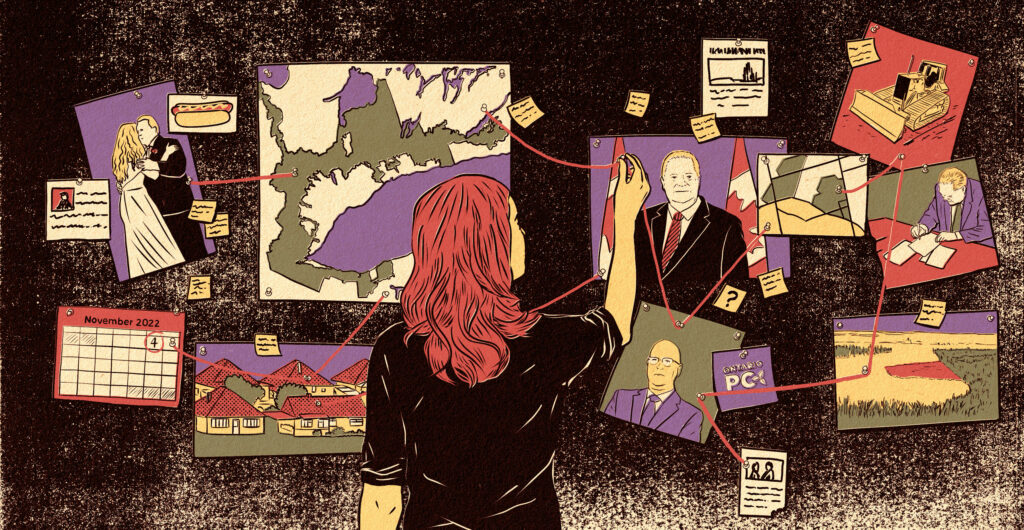
Months before the premier said he learned of Greenbelt cuts from public servants, staffers in his office were sending around an email chain that mentioned the Greenbelt, with one saying he was passing on Ford’s “feedback.”
The email was obtained by The Narwhal via access to information laws and heavily redacted. The Narwhal cannot say exactly what was discussed, or whether it concerned the Greenbelt land swap.
The email has an attached 47-page slideshow and shows the government has internally dubbed relevant communications the “Greenbelt files.” One June entry in the email chain was sent by Andrew Sidnell, the premier’s deputy chief of staff and head of policy, who no longer works in Ford’s office. “Sorry for the late email,” Sidnel wrote in the message sent at 12:15 a.m. “Here is the turn of the [redacted] reflective of the latest premier feedback ahead of tomorrow! Thank you everyone for your patience!”

In a statement, the premier’s office said the document covered a “wide range of policies,” and that Ford did not weigh in on the portions of it related to the Greenbelt.
“I just want to say categorically, no, it wasn’t discussed,” Ford told reporters in May 2023, when asked about the document and whether he had known which Greenbelt parcels were being opened months earlier than he had said. Both he and Clark have said bureaucrats chose where to drop protections and they learned the locations just days before the public announcement. “There is nothing wrong that happened here,” Ford said.
While none of the mandate letters received by Ford’s ministers has been made public, Clark’s was made available to Lysyk for her audit. In her report, she says that the letter directed Clark to “complete work to codify processes for swaps, expansions, contractions and policy updates for the Greenbelt.” The mandate letter also specified that this should “include a comprehensive plan to expand and protect the Greenbelt.”
The Progressive Conservatives’ election platform promised to expand Ontario’s Greenbelt by adding a series of urban river valleys to the protected area — a marked difference from 2018, when Ford proposed opening it up for development.
For years, the Greenbelt Council has sent its recommendations to the minister of municipal affairs in letters that were often made public. The council pushed the government to drop a plan to allow quarries to be built in endangered species habitat, and asked the province to reconsider plans for Highway 413. Members also shared their thoughts with reporters.
But the council went almost entirely quiet after a new media relations protocol was put in place in March 2021. The protocol, obtained by The Narwhal via access to information laws, says the chair can only answer reporters’ questions about the council’s mandate and policies. All council deliberations are now confidential and all other media questions are to be sent to the Ministry of Municipal Affairs and Housing.
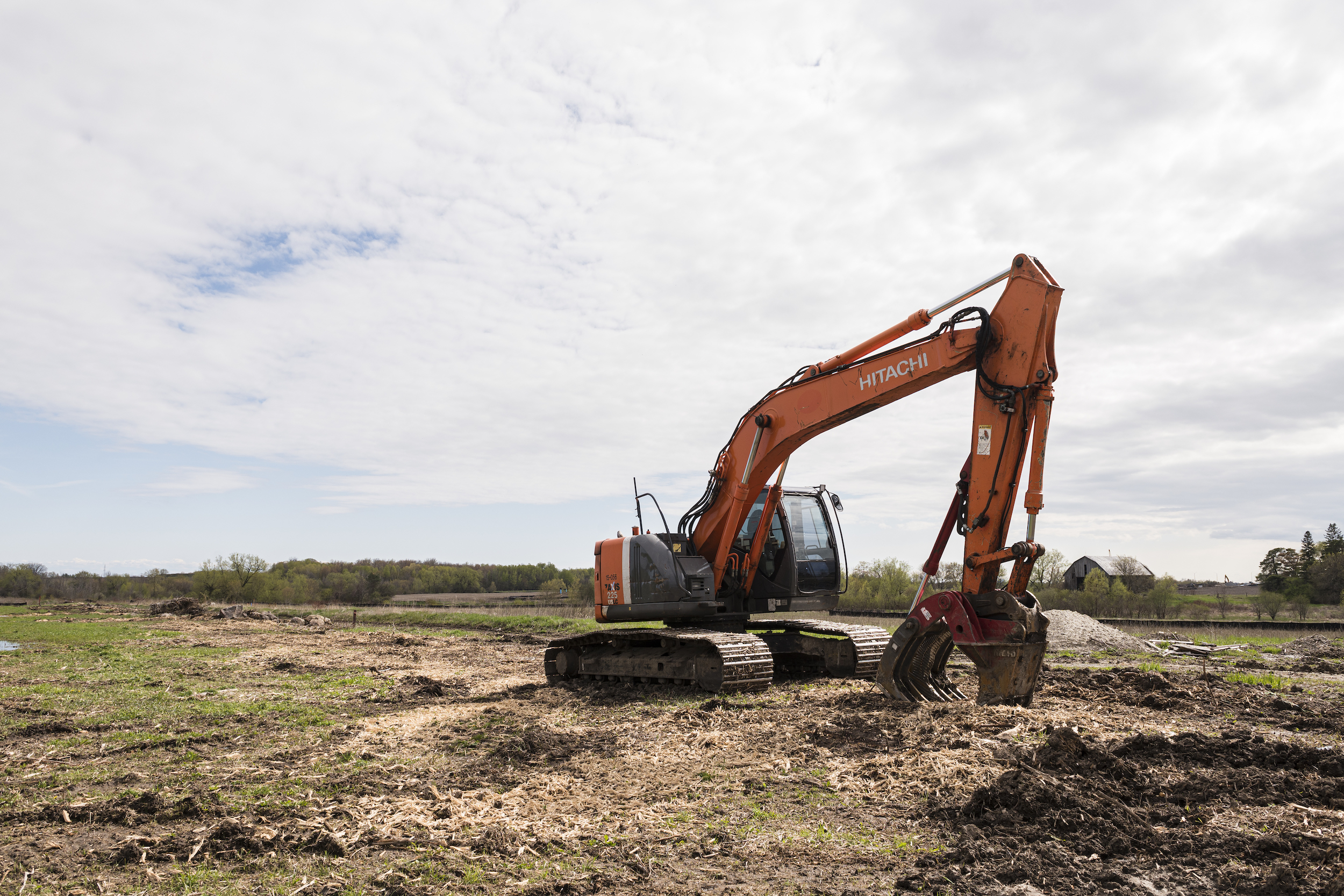
The joint investigation revealed eight of Ontario’s most powerful land developers — including Michael De Gasperis (brother of Silvio De Gasperis) of TACC Developments — own thousands of hectares of land near the proposed route of Highway 413. At least four of these developers are connected to the Progressive Conservatives, having donated, lobbied for or worked with them in some way.
Chair David Crombie, a former Progressive Conservative MP and Toronto mayor, resigned along with six others. All cited the government’s proposed weakening of conservation authorities, agencies that oversee the protect key watersheds, many in the Greenbelt.
Along with the Bradford Bypass, the proposed Highway 413 marked Ford’s first foray into developing parts of the Greenbelt. The government’s map showed the highway would cut through over 800 hectares of farmland, 85 waterways and 220 wetlands. It would also pave over 161 hectares of protected Greenbelt land in Vaughan, and disrupt the habitats of 11 species at risk.
The Progressive Conservatives win a majority government, ousting the Liberals after 15 years in power.
The people have spoken – we will maintain the Greenbelt in its entirety. pic.twitter.com/VcNDZdXtPZ
— Doug Ford (@fordnation) May 1, 2018
After a day of intense public backlash, Ford reversed the assurances he had made to developers about opening the Greenbelt. “Unequivocally, we won’t touch the Greenbelt,” he said. “ I’ve heard it loud and clear: people don’t want me touching the Greenbelt, we won’t touch the Greenbelt.”
Months before the June 2018 election, Ford was caught on video telling a room of developers that his government, if elected, would “open a big chunk” of the Greenbelt in the Greater Toronto and Hamilton Area. Ford described the environmentally sensitive and agricultural land as “just farmer fields.” Opening them up would reduce the cost of new homes, he said.
“I’ve already talked to some of the biggest developers in the country, and, again, I wish I could say it’s my idea, but it was their idea as well,” Ford said in his comments at the time. “Give us property and we’ll build and we’ll drive the cost down.”
Get the inside scoop on The Narwhal’s environment and climate reporting by signing up for our free newsletter. On March 17, federal Conservative Leader Pierre Poilievre...
Continue reading
Notes made by regulator officers during thousands of inspections that were marked in compliance with...

Racing against time, dwindling habitat and warming waters, scientists are trying to give this little-known...

From investigative reporting to stunning photography, we’ve been recognized with four 2024 CAJ Awards nods...
